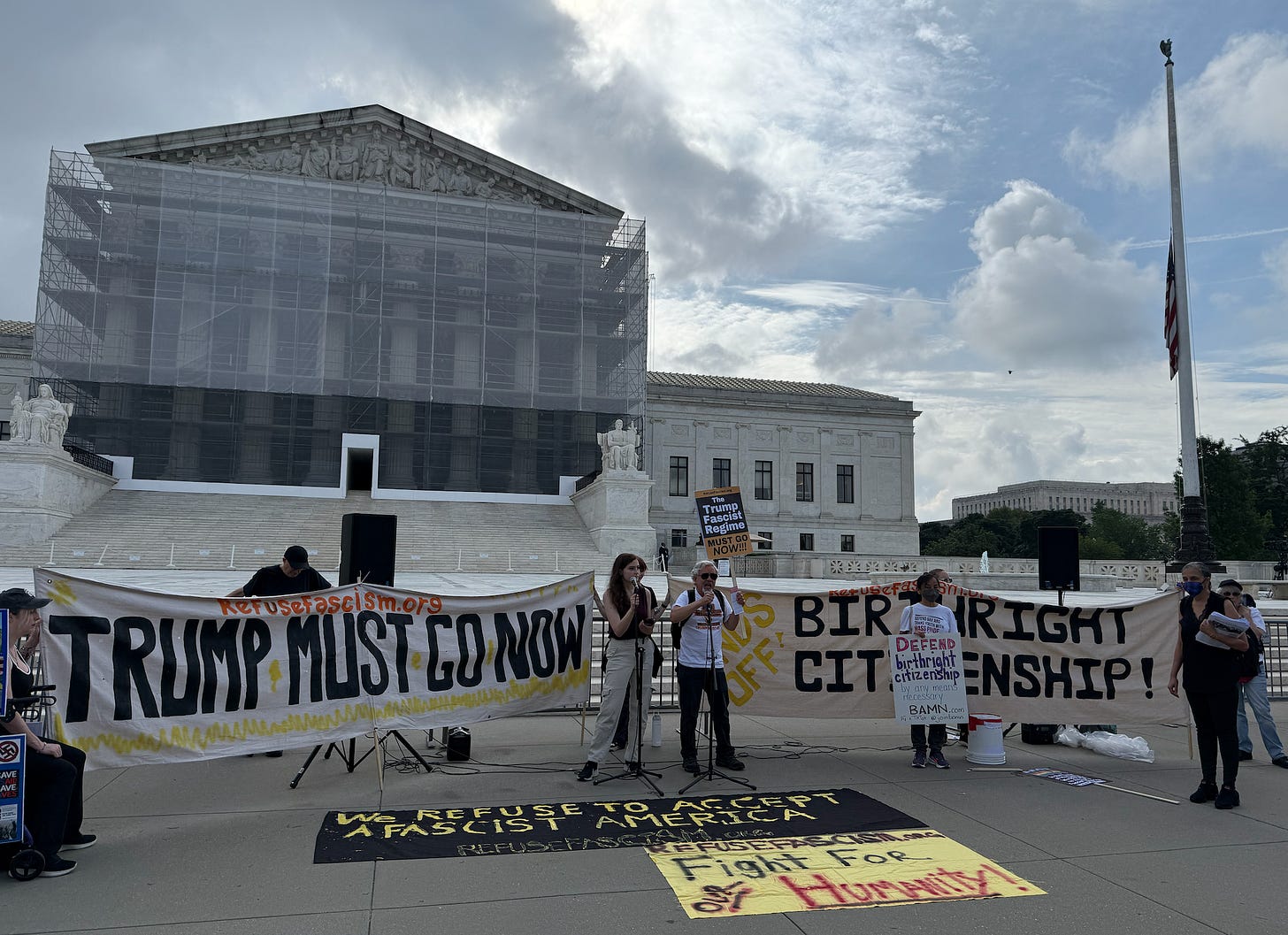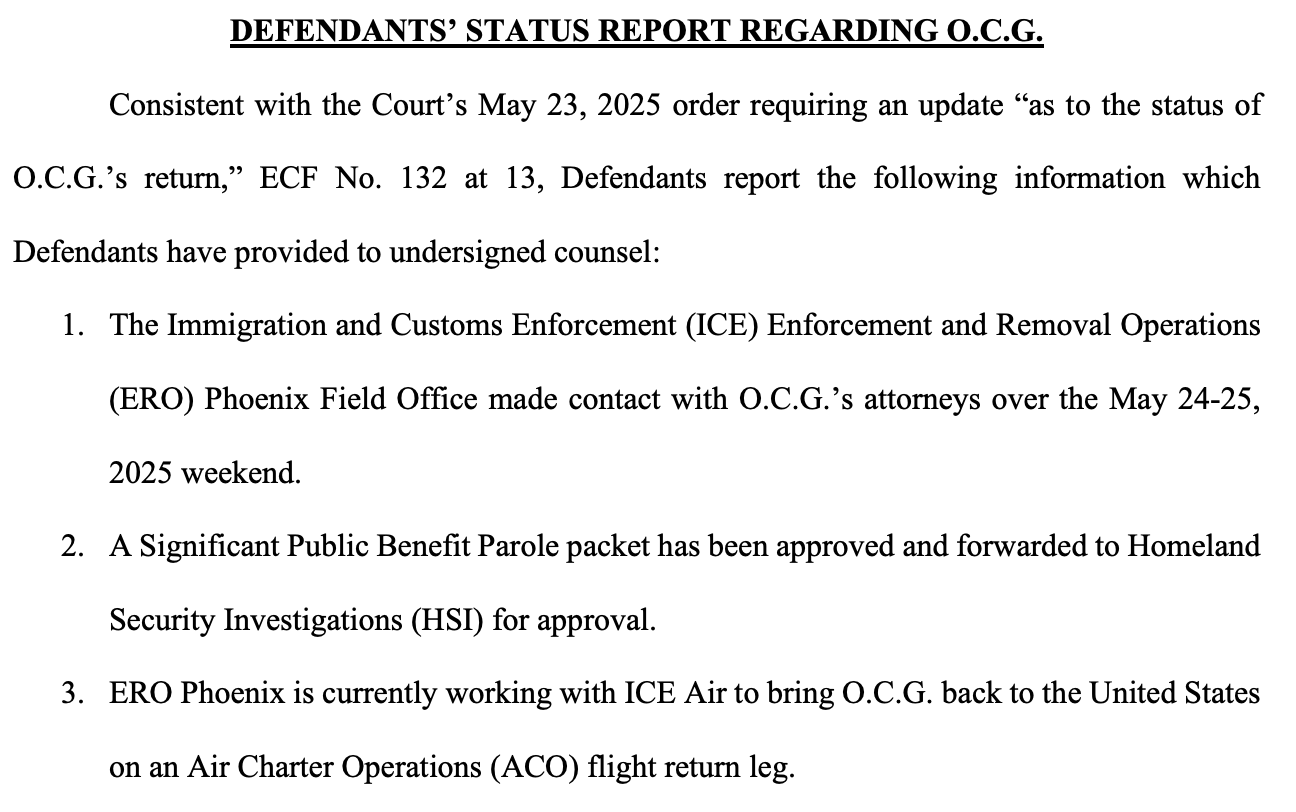Enter June: Preparing for SCOTUS
Decisions this month will affect all of us. Here are the key cases. Also: DHS can facilitate a person's return, it turns out. And, for paid subscribers: Closing my tabs.
Over the next five weeks, we expect the U.S. Supreme Court to release decisions in all of the remaining cases. That means 34 decisions in fewer than that many days.
The Supreme Court’s conservatives will largely control what happens this month with their 6-3 majority. Among other matters, that majority has dramatically increased constitutional protections based on religion even as they decrease other protections — what I’ve referred to as their religious supremacy project. Although Justice Amy Coney Barrett’s recusal from a case over a would-be religious charter school put off a decision for now on that question, there are several other challenges featuring or backed by religious conservative groups and businesses that are likely to expand the religious supremacy project this month.
At the same time, three factors have led to the court at least appearing less extreme than it otherwise might appear. First, the lingering of pushback from the Dobbs decision overturning Roe v. Wade has had an effect on some justices. Second, the need for the court to take and address some of the extremist decisions of appeals courts — primarily, the U.S. Court of Appeals for the Fifth Circuit — makes recent terms look more “balanced” than they would if the justices truly were just choosing the cases they wanted to take. Finally, the political reality of being the Supreme Court in the Trump era means that both time and political capital is spent addressing Trump’s actions rather than other, longer-term goals of the legal right.
This last area is likely to only become a bigger question over time as Trump seeks to part ways with the legal right — as Trump attacks the Federalist Society and begins naming more of his own judicial nominees.
But, the six-justice conservative majority on the Supreme Court still wants to move the law further right — and they are certain to do so in significant ways over the course of this month. (Although we used to say the Supreme Court was expected to release all of their decisions by the end of June, the justices have gone beyond that a few times in recent years, so a safer bet is “before the Fourth of July.”)
The court doesn’t tell us ahead of time what cases are coming on what day — and they don’t even tell us what days they are issuing decisions until (generally) a week ahead of time (although sometimes it’s far less notice).
What we know for now is that the first of those upcoming decision days is Thursday, June 5.
So, what are the biggest cases remaining to be decided?
While the importance of a decision can depend on the ruling — the grounds used to explain the decision, how broad its implications are, and other factors — there are 11 key cases that I’m most closely watching:
Ames v. Ohio Department of Youth Services — Title VII standards in “reverse discrimination” cases — NBC News coverage (Lawrence Hurley)
Kennedy v. Braidwood Management — the Affordable Care Act’s preventative care coverage requirements — Law Dork coverage
Trump v. CASA — the nationwide scope of injunctions blocking Trump’s executive order to end birthright citizenship — Law Dork coverage
Catholic Charities Bureau, Inc. v. Wisconsin Labor & Industry Review Commission — the scope of the religious exemption under a state unemployment compensation insurance law — Law Dork coverage
FCC v. Consumers’ Research — the Federal Communications Commission’s Universal Service Fund and the nondelegation doctrine — SCOTUSblog coverage (Amy Howe)
Free Speech Coalition v. Paxton — age-verification internet regulation and the First Amendment — Law Dork coverage
Louisiana v. Callais — redistricting and equal protection — The Preamble coverage (Leah Litman)1
Mahmoud v. Taylor — religious rights surrounding gender and sexuality discussions in schools — Law Dork coverage
Martin v. U.S. — wrong-house raids and Federal Torts Claims Act — Courthouse News Service coverage (Kelsey Reichmann)
Medina v. Planned Parenthood South Atlantic — “any qualified provider” Medicaid challenge relating to abortion opposition — Law Dork coverage
U.S. v. Skrmetti — challenge to Tennessee’s gender-affirming medical care ban for transgender minors — Law Dork coverage (additional)
Six of those 10 cases — Braidwood, Catholic Charities, Free Speech Coalition, Mahmoud, Medina, and Skrmetti — are all cases that feature religious plaintiffs or lawyers or are significantly backed by religious conservatives.
In addition to those cases, here are five others that I’m watching because they could be significant depending on their outcome:
A.J.T. v. Osseo Area Schools, Independent School District No. 279 — school disability claim standards
Gutierrez v. Saenz — standing and redressability
Laboratory Corporation of America Holdings v. Davis — class certification rules in class action lawsuits
Nuclear Regulatory Commission v. Texas — nonparties and review of agency decisions
Stanley v. City of Sanford, Florida — Americans with Disability Act rights for former employees
Those are less than half of the cases outstanding, so be sure to subscribe here and follow me on Bluesky to keep up with it all as we dive into this month.
The Trump administration can facilitate someone’s return, it turns out
In a May 23 ruling, U.S. District Judge Brian Murphy ordered the Trump administration to “facilitate the return of O.C.G.” — a gay man who had been deported to Mexico without proper process despite has having previously faced violence there.
Five days later, on May 28, the Justice Department reported to Murphy that the Department of Homeland Security is “working … to bring O.C.G. back to the United States,“ providing far more information — at least publicly — regarding those efforts than we have seen in other cases.
Now, as Murphy noted in his May 23 order, “O.C.G. is not held by any foreign government,“ and, as such, DOJ is not raising the same arguments that the Trump administration has been raising in cases involving people sent to the CECOT prison in El Salvador.
Nonetheless, it does go to show how transparent the government could be if it wished to be. The actions taken by the Trump administration regarding the Alien Enemies Act, in sending Kilmar Abrego Garcia to El Salvador, and elsewhere — including the South Sudan deportation efforts being addressed by Murphy — were the opposite: They were actions taken specifically to block — or prevent — accountability.
Closing my tabs
This Sunday, these are the tabs I am closing:







